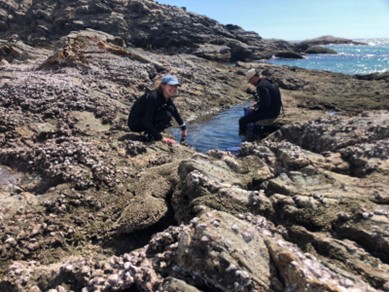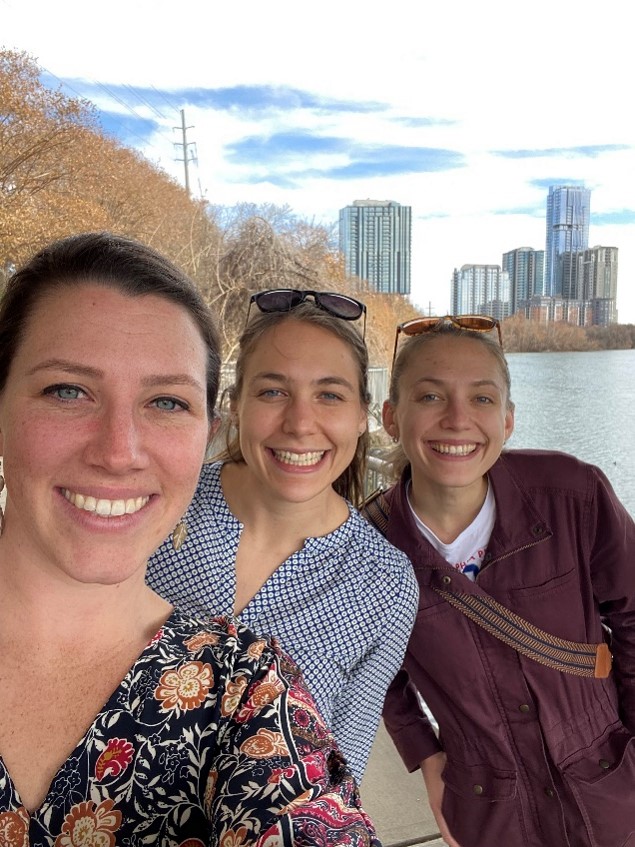 From January 3rd-8th I had the opportunity to attend the annual meeting for the Society for Integrative and Comparative Biology (SICB), which was held in Austin, Texas. This was my first professional conference, as well as my first time giving a talk as a graduate student. I was excited for this experience, and very thankful for the travel support provided by a Florida Museum Travel Grant.
From January 3rd-8th I had the opportunity to attend the annual meeting for the Society for Integrative and Comparative Biology (SICB), which was held in Austin, Texas. This was my first professional conference, as well as my first time giving a talk as a graduate student. I was excited for this experience, and very thankful for the travel support provided by a Florida Museum Travel Grant.
SICB encompasses a broad array of organismal research and covers topics ranging from comparative morphology and ecology to systematics and biomechanics. It is divided into various focus divisions. As a PhD student in the Invertebrate Zoology department at the Florida Museum, I am mainly affiliated with SICB’s Division of Invertebrate Zoology. Throughout the course of the conference, I was able to attend many talks and poster sessions within the scope of Invertebrate Zoology. It was great to hear about projects that are similar to my own research interests, and learn new ways of approaching these questions. There was a wide diversity of marine invertebrates represented across the conference and it was fun to learn more about taxa that I am unfamiliar with. I also valued the chance to chat with other students and scientists about their work in-person. These opportunities to make new connections are valuable as I move forward with my graduate work and get to know the larger invertebrate zoology community.
 After a few days of attending sessions, I gave my own talk, titled “Cryptic diversity and concordant geographic restriction in Arabian Aquilonastra sea stars”. This talk gave me the opportunity to share the current results of an ongoing project that I have been working on with Dr. Gustav Paulay and Lisa Mussoi. My study taxa, species in the sea star genus Aquilonastra, are known to be highly cryptic, but genetic diversity is poorly studied. This genus is particularly prevalent on hard bottoms across the Arabian Peninsula. Our sampling across this region has recently been improved by three recent BioBlitzs in Oman led by Gustav Paulay that aim to uncover understudied taxa. In this study we used DNA barcodingo show that cytochrome c oxidase 1 (COI) diversity is higher than that of currently recognized species in this region. We then used species delineation methods to define Molecular Operational Taxonomic Units (MOTUs), and explored where these genetic breaks were occurring. COI revealed genetic breaks between Red Sea, Arabian Sea, and Gulf of Oman sister taxa that reoccurs multiple times across this phylogeny, suggesting a pattern of consistent reproductive isolation between these regions. By identifying these consistent genetic barriers, we are better able to make predictions about the factors shaping genetic connectivity in this ecologically variable region. I am exciting to continue moving this project forward. Our next steps will include adding more sampling across the region, as well as additional genetic markers to build a more robust phylogeny.
After a few days of attending sessions, I gave my own talk, titled “Cryptic diversity and concordant geographic restriction in Arabian Aquilonastra sea stars”. This talk gave me the opportunity to share the current results of an ongoing project that I have been working on with Dr. Gustav Paulay and Lisa Mussoi. My study taxa, species in the sea star genus Aquilonastra, are known to be highly cryptic, but genetic diversity is poorly studied. This genus is particularly prevalent on hard bottoms across the Arabian Peninsula. Our sampling across this region has recently been improved by three recent BioBlitzs in Oman led by Gustav Paulay that aim to uncover understudied taxa. In this study we used DNA barcodingo show that cytochrome c oxidase 1 (COI) diversity is higher than that of currently recognized species in this region. We then used species delineation methods to define Molecular Operational Taxonomic Units (MOTUs), and explored where these genetic breaks were occurring. COI revealed genetic breaks between Red Sea, Arabian Sea, and Gulf of Oman sister taxa that reoccurs multiple times across this phylogeny, suggesting a pattern of consistent reproductive isolation between these regions. By identifying these consistent genetic barriers, we are better able to make predictions about the factors shaping genetic connectivity in this ecologically variable region. I am exciting to continue moving this project forward. Our next steps will include adding more sampling across the region, as well as additional genetic markers to build a more robust phylogeny.
In addition to all the new people I had the pleasure of connecting with at SICB, I also had the support of an extra special colleague – my sister! Jennifer Uehling is a PhD Candidate at the University of Cornell and will be defending her dissertation in March. It was fun to be able to support each other and learn more about each other’s science.
Thank you to the Florida Museum Travel Grant for supporting my travel to this conference!
Abby Uehling is a graduate student pursuing a Ph.D. through the College of Liberal Arts and Sciences, Department of Biology, advised by Dr. Gustav Paulay, Curator of Invertebrate Zoology here at the Florida Museum.
The 2023 Spring Student Travel Awards are supported by the FLMNH Department of Natural History, including funds from the Louis C. and Jane Gapenski Endowed Fellowship. If you would like to help support this fund for future student awards, please go to:
Louis C. and Jane Gapenski Endowed Fellowship